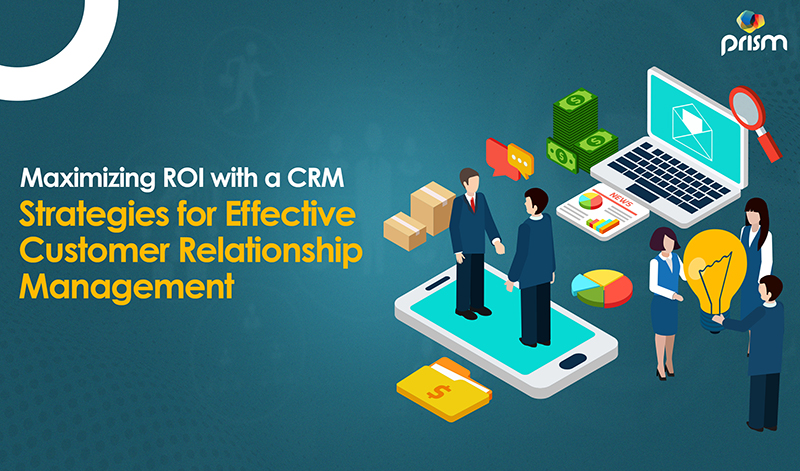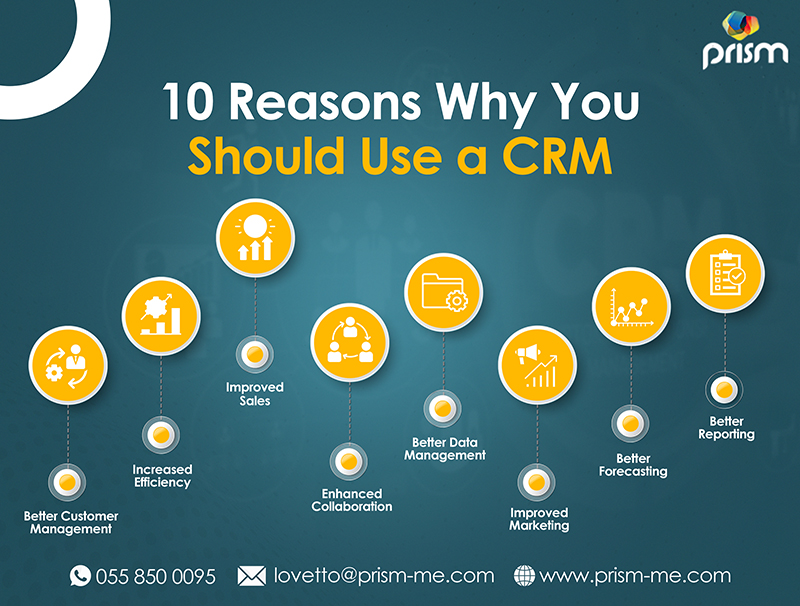
Table Of Contents
- Why do Businesses Need a CRM?
- 5 Simple Formulas to Measure the ROI on Your CRM Investment
- 5 Tips to Improve Your Current CRM System
- Why AI for CRM Automation Is Important for Any Business?
- Integrating ERP Systems and CRM
- Conclusion
In today's hyper-competitive business world, customer relationship management (CRM) is more crucial than ever before. A CRM system is a powerful tool that helps companies manage their interactions with customers, streamline processes, and ultimately, increase their return on investment (ROI).
By organizing and tracking customer data, a CRM can provide valuable insights into customer behavior, preferences, and needs, which can help businesses make more informed decisions and provide better service. In this blog, we will explore how companies can maximize their ROI with a CRM by leveraging its various functionalities to drive growth, increase sales, and enhance customer engagement.
According to a report by Nucleus Research, businesses can expect an average return of $8.71 for every dollar invested in CRM. That's a significant return on investment, and it's not hard to see why.
A CRM system can provide valuable insights into sales and marketing data, such as lead conversion rates, customer acquisition costs, and campaign ROI. By analyzing this data, businesses can make data-driven decisions and adjust their strategies accordingly
Why do Businesses Need a CRM?
One of the key benefits of a CRM system is that it allows businesses to centralize their customer data. By keeping all customer data in one place, companies can access a comprehensive view of their customers, including their purchase history, preferences, and behaviors.
Centralizing customer data
A CRM system enables companies to store and manage customer data in a centralized location. This makes it easier for businesses to access and analyze customer information, such as contact details, purchase history, and communication preferences.
Improving customer service
By having access to comprehensive customer data, companies can provide better customer service. With a CRM system, businesses can track customer interactions and preferences, allowing them to offer personalized support and address customer concerns more efficiently.
Streamlining sales processes
A CRM system can help companies streamline their sales processes by automating tasks such as lead capture, lead nurturing, and follow-up. This can help businesses close deals more quickly and efficiently.
Boosting customer retention
A CRM system can help companies better understand their customers' needs and preferences, which can help businesses tailor their products and services to meet those needs. This can increase customer satisfaction and loyalty.
Analyzing sales and marketing data
A CRM system can provide valuable insights into sales and marketing data, such as lead conversion rates, customer acquisition costs, and campaign ROI. By analyzing this data, businesses can make data-driven decisions and adjust their strategies accordingly.
Before we move forward, if you’re a business owner that requires a CRM, we at Prism CRM solutions offer complete ZOHO CRM integration services with complete setup and training. We’re the authorized Zoho Partners in the UAE who can help you set up your CRM and put you on the road to success.
5 Simple Formulas to Measure the ROI on Your CRM Investment
1. Customer Lifetime Value (CLV) Formula:
This formula helps you calculate the total amount of money that a customer is likely to spend on your business over their lifetime. To calculate CLV, multiply the average annual revenue per customer by the average number of years that a customer stays with your business. For example:
CLV = (Average Annual Revenue per Customer) x (Average Number of Years Customer Stays)
2. Customer Acquisition Cost (CAC) Formula:
This formula helps you calculate how much it costs your business to acquire each new customer. To calculate CAC, divide the total cost of your CRM investment by the number of new customers acquired as a result of that investment. For example:
CAC = (Total Cost of CRM Investment) / (Number of New Customers Acquired)
3. Customer Retention Rate (CRR) Formula:
This formula helps you calculate the percentage of customers who continue to do business with your company over a specific period of time. To calculate CRR, divide the number of customers who continue to do business with your company by the total number of customers at the beginning of the period. For example:
CRR = (Number of Customers at End of Period) / (Number of Customers at Beginning of Period)
4. Conversion Rate Formula:
This formula helps you calculate the percentage of leads that turn into paying customers. To calculate the conversion rate, divide the number of leads that turn into paying customers by the total number of leads. For example:
Conversion Rate = (Number of Leads that Turn into Paying Customers) / (Total Number of Leads)
5. Return on Investment (ROI) Formula:
This formula helps you determine the profitability of your CRM investment. To calculate ROI, subtract the total cost of your CRM investment from the total revenue generated as a result of that investment, then divide that number by the total cost of your CRM investment. For example:
ROI = ((Total Revenue Generated) - (Total Cost of CRM Investment)) / (Total Cost of CRM Investment)

5 Tips to Improve Your Current CRM System
You might be using a CRM but it doesn’t necessarily mean that you’re getting the most out of it. CRM systems need to be tailored to your unique business needs to get the maximum out of them. In order to do that, you’ve got to first define the objectives and set the metrics that you should be measuring. These simple tips will allow you to use your current effectively and maximize value.
1. Define your goals and objectives
Before making any changes to your CRM system, it's essential to define your goals and objectives. Determine what you want to achieve with your CRM system, such as increasing sales or improving customer satisfaction.
2. Streamline data entry processes
To improve your CRM system, you need to make sure that data is being entered accurately and consistently. Streamlining data entry processes can help minimize errors and ensure that data is entered in a standardized format.
3. Automate processes
Automation can help save time and reduce the risk of errors. Look for opportunities to automate repetitive tasks such as data entry, lead assignments, and follow-up emails.
4. Enhance customer data
Improving customer data is key to making your CRM system more effective. Consider integrating your CRM system with other tools such as social media or survey tools to gather more information about your customers.
5. Train your team
To ensure that your CRM system is being used effectively, you need to train your team on how to use it properly. This includes providing training on data entry, reporting, and analysis.
AI for CRM Automation - Why Is It Important for Any Business?
AI for CRM automation is the use of artificial intelligence and machine learning algorithms to automate and streamline CRM processes. It enables businesses to collect and analyze vast amounts of customer data, automate repetitive tasks, and deliver personalized experiences to customers.
One of the most significant benefits of AI for CRM automation is its ability to save time and improve efficiency. By automating tasks such as lead scoring, data entry, and customer segmentation, businesses can free up their employees' time to focus on other tasks.
AI-powered CRM automation also enables businesses to deliver personalized experiences to their customers. By analyzing customer data such as purchase history, preferences, and behaviors, businesses can tailor their marketing messages and sales pitches to each individual customer, increasing the likelihood of conversion and repeat business.
Another advantage of AI for CRM automation is its ability to identify patterns and trends in customer data. By analyzing customer behavior and feedback, businesses can gain valuable insights into customer needs and preferences, enabling them to improve their products and services continually.
Integrating ERP Systems and CRM
Enterprise Resource Planning (ERP) and Customer Relationship Management (CRM) are two important systems that businesses can use to streamline their operations and improve their customer experiences.
While these two systems have different functions, integrating them can offer numerous benefits for businesses. Here are 7 benefits of integrating ERP and CRM
1. Improved data accuracy
By integrating ERP and CRM, businesses can ensure that all their data is accurate and up-to-date. This can help to avoid data duplication and inconsistencies, which can lead to errors and miscommunications.
2. Increased efficiency
With an integrated system, businesses can reduce the time and effort required to manage data across multiple platforms. This can help to streamline workflows and increase productivity.
3. Better customer service
By combining ERP and CRM data, businesses can gain a better understanding of their customers’ needs and preferences. This can enable them to provide personalized experiences and improve customer satisfaction.
4. Enhanced reporting
With an integrated system, businesses can generate more comprehensive reports that include both ERP and CRM data. This can provide greater insight into their operations and help them to make more informed decisions.
5. Increased sales
By integrating ERP and CRM, businesses can gain a better understanding of their sales process and identify opportunities for growth. This can help them to increase sales and revenue.
6. Greater visibility
With an integrated system, businesses can gain greater visibility into their operations and customer interactions. This can help them to identify areas for improvement and make more informed decisions.
Conclusion
In conclusion, a CRM is an essential tool for businesses that want to improve their customer relationships and increase efficiency. But to get the most out of your CRM, it's important to choose the right platform, customize it to your specific needs, and train your employees on how to use it effectively.
If you're looking for a reliable CRM solution, Prism CRM Solutions offers ZOHO CRM services with complete integration and training. With our help, you can optimize your CRM and achieve your business goals more efficiently than ever before. See you on the other side.

About The Author: Lovetto Nazareth
Lovetto Nazareth is a digital marketing consultant and agency owner of Prism Digital. He has been in the advertising and digital marketing business for the last 2 decades and has managed thousands of campaigns and generated millions of dollars of new leads. He is an avid adventure sports enthusiast and a singer-songwriter. Follow him on social media on @Lovetto Nazareth



